


|
|||||
| concert reviews | cd reviews | interviews | features | ticket swap | music news |
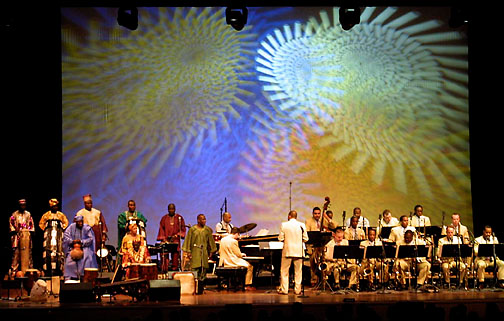
|
Review and photos by Andy Argyrakis After helping elevate the jazz genre to an even more mainstream platform throughout the 1980s, Wynton Marsalis has embarked upon a number of compelling paths. Yet the famed trumpeter/composer/conductor is currently in the midst of an incredibly ambitious streak thanks to his new work Congo Square, which he's been staging all across the country backed by the Jazz at Lincoln Center Orchestra, along with drum master Yacub Addy and his eight piece Odadaa! Troupe.Of course the theme centers around the famed geographic landmark in New Orleans, which has played host to some of the regions' most eclectic musicians (often times enslaved African Americans) that thrived from the mid-1700s through the late 1800s. 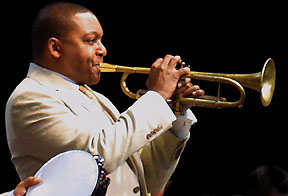 In fact
many historians pinpoint that place and time period as
the true birthplace of jazz at the turn of the
century, which was showcased in full form by the
spacious cast of players in Ravinia's gorgeous and
acoustically perfect confines.
In fact
many historians pinpoint that place and time period as
the true birthplace of jazz at the turn of the
century, which was showcased in full form by the
spacious cast of players in Ravinia's gorgeous and
acoustically perfect confines.In wake of the ongoing Hurricane Katrina relief efforts, the entire performance was especially hopeful, signaling the musical vitality of the Crescent City and reminding attendees why this holy grail of American roots music can never be forgotten. Marsalis and company made sure that was the most overpowering message of the generally instrumental evening, which despite only a handful of words throughout a two act, two hour show, rang through loud and clear thanks to a diverse blend of traditional jazz, African American rhythms and flourishes of Dixieland (furthered in an encore segment with accompaniment by the eight piece Pinstripe Brass Band). But long before that heralded home stretch, the event balanced on the interplay of Marsalis' star power, the gloriously lush Jazz at Lincoln Center Orchestra and the robust beats of 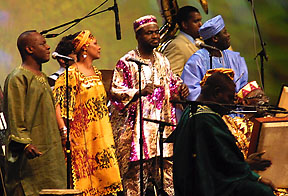 Addy and his ensemble (who ran
the stylistic gamut of Afro Celt Sound System to
Ladysmith Black Mambazo). The roughly sixteen piece
suite also catered to a very delicately measured
equilibrium between laid back, mid-tempo structuring
and all out jazz-centered jamming, complete with
theatrical trade offs between the percussion and brass
sections. Addy and his ensemble (who ran
the stylistic gamut of Afro Celt Sound System to
Ladysmith Black Mambazo). The roughly sixteen piece
suite also catered to a very delicately measured
equilibrium between laid back, mid-tempo structuring
and all out jazz-centered jamming, complete with
theatrical trade offs between the percussion and brass
sections.Though the fully collaborative effort was the sonic equivalent of Mardi Gras at full force, faithful Marsalis fans were likely left scratching their heads as to why the legendary player spent most of his time conducting the program rather than actually performing. Sure, he picked up his instrument on a half dozen occasions, but for more than half the performance, it was simply sheet music and hand signals. A moderately publicized previous lip injury was possibly a factor, but in stepping back from center spotlight, he also demonstrated that the Congo Square concept is truly a shared endeavor. And no matter who participated in which part, the overall outcome was a tribute to this reborn national treasure that continues to channel its past as a building block for the future. |
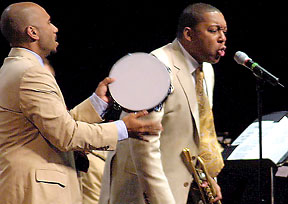 |
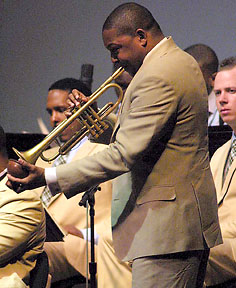 |